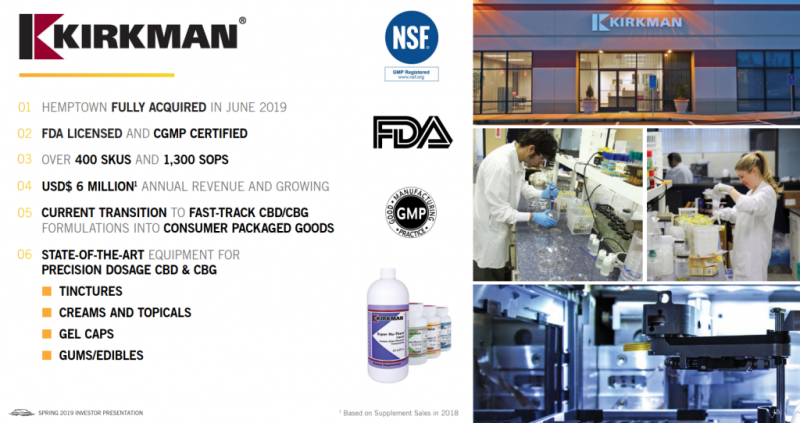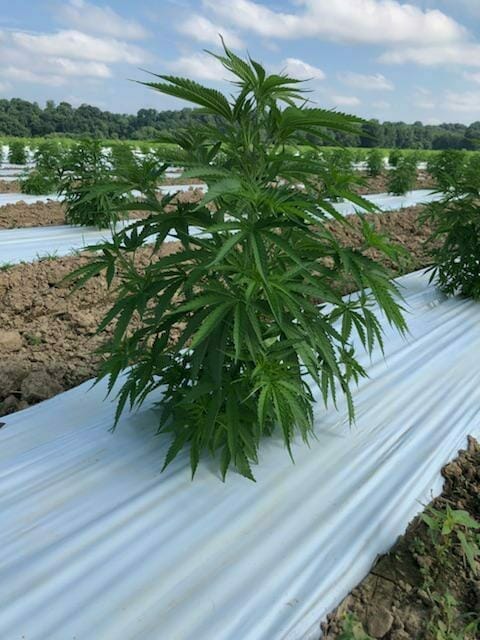A few years ago, we wrote one of our defining pieces at Equity.Guru, an article that opened a new world up for a variety of investors, and introduced them to a pre-public listing deal that, for a change, was opening up to the little guy.
So you missed Canopy/Tweed coming to the market. You stood back and watched Supreme blast off. You missed Aurora popping, and the Emblem financing and CannaRoyalty deal, those were too hard to get a piece of. You’re standing there watching all these chumps having gotten rich while you stood idly by, thinking, “The next one… I’ll get on the next one..”
Hey. Here’s the next one. If you’ve never participated in a financing before, this is your chance to get in the program. I’m going to walk you though the process of taking part in a private placement financing, and one of the bigger pre-listing financings for some time, as things stand.
At the time, The Green Organic Dutchman (TGOD.T) was a largely unknown project still eighteen months from going public. But the wave of people who realized from our article that a) they were accredited investors and didn’t know it, and b) there was serious potential profit in the deal, saw TGOD need to set up a ‘war room’ of employees going through sub documents.
4400 were asked for, with a ton of those being first time private placement entrants. 2300 completed docs were approved at $1.15 per share, with warrants attached.
That was a massive undertaking, especially for a company over a year away from where folks could actually sell their stock. But it wasn’t their last wave at the crowd; TGOD did another raise six months before their listing, this time for $1.65 per share, with warrants again, and another 1300 names were added to the share register.
On going public, yet another raise, this one at $3.65, brought in tens of millions of dollars more, and an investment from the giant Aurora Cannabis (ACB.T).
Whatever your personal take on TGOD today, the ups and downs of that stock, the potential going forward and the millions made by insiders through that process, none of the people who got in on those two earliest financings lost money.
Not a single one.
And that’s why we like early stage finance rounds. Naysayers will rabbit on about how ‘folks in the know get all the cheap stock and flush it while retail investors are trying to stay above water,’ and they’re not lying. The early stage investors usually get in cheaper (because they’re taking on a bit more risk and longer timelines to be able to recoup), and they get the added upside of warrants (an agreement that you can buy future stock at a set price, should it ever be profitable to do such a thing). That’s no small advantage.
The thing is, a lot more people qualify to be among those early stage investors than realize it.
YOU MAY BE ACCREDITED AND NOT EVEN KNOW IT
To be clear, I wasn’t actually an accredited investor until my 15th or so ‘accredited investors only’ private placement financing, which means, yeah, I lied on the forms to get in on early deals.
That I had to, sucked. Being born rich shouldn’t give you an unfair advantage in access to early stage deals any more than being born poor and working hard, saving money, and doing years of research in the markets should mean you remain unqualified for them due to some weird regulatory desire to protect you from yourself.
This helpful 40 second video will help you figure out if you qualify.
So that’s all important to know. But there’s been a change in the game recently. Nowadays, if a company decides to make things open to everyone, that’s a thing they can do legally.
YOU MAY NOT NEED TO BE ACCREDITED AFTER ALL
An increasing number of companies are looking to the retail investor INSTEAD OF the accredited investor when they do their finances. To do that, they use what’s called an ‘offering memorandum’, which allows unaccredited folks to take a small stake in a raise, as long as they’re told what a huge mistake that might be by their broker.
Yeah. You need a broker. And one who is prepared to handhold hundreds of little investors rather than just feed one big one into the raise. That’s it’s own hassle.
But one company has taken that path recently, and it’s raising a TON of money leading up to its public listing.
We’ve Been Busy from Hemptown Organics on Vimeo.
Hemp matters. It won’t get you high, but that’s a good thing, in that it allows companies to grow great fields of the stuff without having to put a roof over the top of it all.
Roofs are expensive. Walls likewise.

But plowing a field and plonking down hemp, which actually helps replenish the soil, which is suitable in drought conditions, which grows so fast it chokes out the weeds around it, which can do all the healthy things industrial cannabis can do but for a ton less capital in getting started and keeping it going… that’s easy business.
And big business.
In 2018, Hemptown Organics boomed. Their 2019 revenue projections, based on number of seedlings planted and acres plowed in 2018, are great: $23 million.
But 2020 expectations, based on what’s planted right now, are off the charts.
- 1,550+ Acres
- 3,000,000 lbs+ Biomass
- $100,000,000+ Revenue
HMMM…
Regular readers know my butt isn’t one to willingly accept smoke blown up it (Charlize, call me), so I questioned the company on these numbers. They told me they’ve actually knocked their projections down because the internal projections didn’t appear believable.
To which I will always call bullshit.
So I did my own research.
They have 1500 acres of land (actually more, but let’s keep it easy). According to this report in US News, an acre of hemp – the right kind of hemp, planted and maintained and harvested and processed the right way – can bring $100k+ in oil, meal, seeds etc.
At that price (and let’s be clear, those were 2018 commodity prices, which did fall some by year end but have held steady in 2019) that’s $150 million of product per harvest.
There’ll be costs: Industry average is $409 per acre in expenses in pulling hemp out of the ground, good for $613k out the door per harvest on Hemptown’s acreage, but let’s assume $3m just in case that’s optimistic. Processing the hemp into an oil product isn’t cheap, or quick, but it’s blown away by the revenue side. The company says its margin will be 79% on the low end.
So, yeah, that $100 million Hemptown projection for 2020? Feel free to send us in your own math on this, but we feel like it’s pretty accurate, at least as far as projections can ever be.
(NOTE: There are higher projections in the most recent Hemptown investor deck, based on deals for new farm space being currently worked on – I’m going to stick with the cynical view, because I think it still makes an impressive case)
Whether the market can take that sort of injection of new product without prices tumbling in the future is something to be guessed at. Without knowing how high and fast CBD products are going to grow on the consumer side in the coming years, how quickly laws will evolve to permit it, and how much costs like testing and sourcing new seed will rise or fall, we figure the rise in production will probably outstrip demand, but not by enough to put Hemptown in any sort of trouble.
There is the topic of what kind of hemp you’re growing, and whether it’s what you need to make the most money per acre, and what your equipment can handle when it comes to harvest time.
A regular combine harvester will get gummed up with hemp oil if used on the wrong product, and in the wrong way, and specific equipment needs have both hurt farmers who didn’t do their research up front, and LPs who did deals with such farmers without their own due diligence.
Eureka 93/Livewell (ERKA.V) took a hit on some hemp they acquired last year that, it turned out, didn’t hit the numbers they’d hoped for and couldn’t be easily/economically used with the set-up they had. Legal negotiations continue. They’re far from alone. For a lot of hemp players, the education road has been longer and more expensive than they thought.
For years, hemp nut-huggers have been rallying on about how it’ll replace concrete and cars and sex dolls and the letter ‘R’, in a monorail sales campaign that would have left Brockway, Ogdenville and North Haverbrook impressed.
“But Main Street is all cracked and broken!”
“Sorry mom, the mob has spoken.”
But hemp for health is a real thing, and massive growth industry that has already taken hold in Europe in ways North America hasn’t experienced yet. South Korea has gone through a hemp heart phase that saw a massive boom there. The rest of the world is gearing up.
Aurora Cannbis (ACB.T) made a big investment in Hempco (HEMP.V) a few years back, an investment they doubled down on when they took out the whole deal recently. Say what you will about whether they overpaid, but the investment was made because they believe there’ll be a massive industry shortly that will require their processing power.
Hempco processes hemp and does so well. But Hemptown aims to grow the stuff in tonnage that will supply small nations, let alone an Aurora subsidiary.
They’ve already established beachheads in Oregon, Colorado, and Kentucky. The latter state has been angling to switch from tobacco to hemp for years now, and the recently passed US farm bill, which brought hemp out into the open at last, has finally made that a reality.
The Hemptown product page notes CBG as an important product in their mix, and that’s particularly interesting. Those in the know like CBD plenty but point to CBG as being a real health hub that the market hasn’t yet respected.
In fact, CBG is their focus. They’ve sourced 1m hemp seeds focused on CBG output this year, and for the next four following. THIS IS NOT AN EASY PROCESS. CGB seeds are in short supply.
In terms of costs, Hemptown will go through that $23m in revenue this year setting up the company for future growth. They’re going to put $5.5m into genetics and seeds this year, $4m into farm equipment, and $3m into leases of the properties themselves. There’ll be another $4.5m in oil processing equipment and a GMP facility.
So be it.
On the management side, there’s a lot to like here. CEO John Cummings led compliance and special projects for California’s Kings Garden, a vertical integrator with a substantial rep.
Founder and Chairman Rob Wolterman started the show in 2016, having been in the cannabis space in California for the last 21 years where he’s invested in, and helped finance, numerous operations.
Mike Townsend is the President, and that’s where the money men come in. Townsend has been a fixture on the Canadian smallcap investment scene for a long time, with some big wins in his recent wake, including the $250m tech deal Patriot One (PAT.T), which was recently elevated to the TSX Big Board, and the $50m Nevada cannabis play Body and Mind (BAMM.C).
Townsend is a deal dog, and that’ll rattle some. As with everyone who puts together public company listings, his deals don’t always pan out in the long run, but almost everything he puts forth goes up for a good while, and early investors tend to enjoy the ride, which is why his book is deep and he usually has a few deals running at once.
With Hemptown, he’s put everything else on hiatus. In talks with him over two podcasts to date, he’s told me he sees Hemptown as his legacy deal, the one that he will be remembered for, and the one that will have the most upside. He doesn’t have an e-sports deal and a blockchain deal and a weed deal in his back pocket. He’s ride or die on Hemptown.
If all of that sounds great, that’s cool – but there’s more.
Hemptown just acquired Kirkman Labs. So add another $6m on their annual revenue line.

Kirkman’s Key Features:
- Fully operational FDA licensed, cGMP 25,000 sq. ft. nutraceutical manufacturing facility, with over 1,200 SOPs.
- 70 years of supplying world class formulations for children with autism and special needs
- Existing $6 million annual revenue
- Revenues are expanding.
- Former owner and Chairman David Humphreys, a board member on the American Academy of Cannabinoid Medicine (AACM), will assist in liaising with the community of doctors who focus on cannabinoid medicine.
- Facility is comprised of state-of-the-art formulations and equipment to facilitate precision dosage CBD & CBG liquid fill tinctures, creams and topicals, gel caps, and gums/edibles.
- Key Kirkland management and technical team will be retained.
- Hemptown anticipates a seamless transition to fast-track CBD/CBG product formulations into wholesale, retail and on-line markets.
Why does any of this matter to you?
Because those early deal guys, the ones who get the cheap stock because they’re going to be in it for a while, and who can’t sell that stock for a period of time once it lands, and who get warrants as thanks for that patience?
That’s open to you guys this time around.
Just as with the TGOD deal a few years back, this deal wants you and your friends and little guys aplenty to form a large raft that will help the company float.
Often, when one big financier decides he needs a bigger boat, a company can get crushed as his shares are blown out. Hemptown wants to avoid this possibility by having safety in numbers.
To that, they’re using an offering memorandum to let you in to the room. The room with the oak and mahogany and leather, where cigars are puffed and deals are done.
Whether that sort of option is right for you or not is not something I can advise on. Indeed, it’s why the offering memorandum was created as a tool – to ensure that, while you guys can participate earlier, and at a cheaper price, that you have a financial advisor talk to you first so you don’t do something silly, like mortgage the house.
The offering memorandum means ANYONE CAN PLAY.

If you’d like to take a deeper look, click here, request the subscription documents, read them from top to bottom, and do as much due diligence as you can.

Understand earlier financiers got in cheaper than you will, but that you may be getting in cheaper than the market will. Bring in outside voices. Listen to the angel on your shoulder. Assess your risk and understand there’ll be a trade hold period of six months from the date of going public, and if the stock doesn’t rise, your warrants may never be worth anything. Also, that if the stock goes up, as it did for TGOD’s early guys, that you’re going to be taken on a wild ride.
Getting into a financing has risk, and you shouldn’t make the decision to do so without extensive research. I got in on an earlier debenture round, and will be adding more this round, so understand I’m totally conflicted.
— Chris Parry
FULL DISCLOSURE: Hemptown Organics is an Equity.Guru marketing client. The author has invested in several financing rounds. Neither the author or Equity.Guru receive any commission for anyone investing in this or any financing round, nor do we charge a fee for the service of exposing investors to any financing. We provide the information here entirely as a service to readers, because we’ve been asking many companies to open their financing to smaller investors through the offering memorandum, and Hemptown is one of the few to answer the call.


Leave a Reply